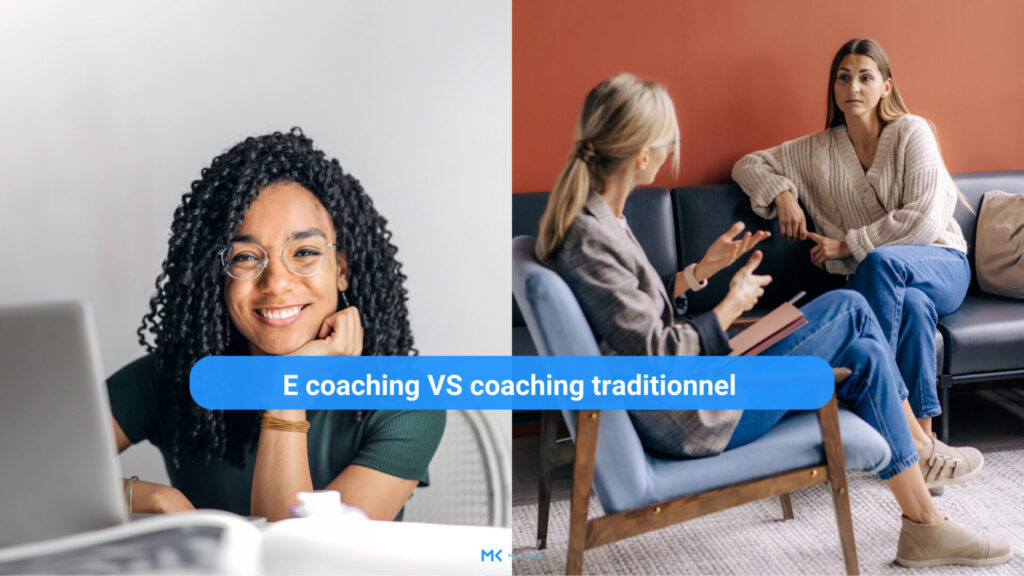In the contemporary panorama of personal development, two approaches are emerging: e-coaching and traditional coaching. These two methods, although different, are complementary and offer distinct advantages. E-coaching, flexibility incarnate, allows remote support, in line with our digitalized lifestyles. Traditional coaching, for its part, capitalizes on direct human relationships and the depth of face-to-face exchanges. Back to basics or modernity, each method has its advantages in the current coaching landscape.
In this article's summary
ToggleI. The key distinctions between e-coaching and traditional coaching
has. Definition of e-coaching and traditional coaching
E-coaching, also called online coaching, offers remote support via different digital tools: video conferences, telephone calls, email exchanges or even live chats. Traditional coaching, on the other hand, is mainly done face-to-face, in a dedicated environment.
The choice between these two forms of coaching, however, depends on many criteria, and it is important to understand their differences to make the most appropriate choice for your needs.
b. The specific characteristics of e-coaching and traditional coaching
E-coaching stands out for its flexibility and accessibility. You can actually follow your coaching sessions wherever you are, at any time of the day or night.
Traditional coaching, on the other hand, is characterized by its physical setting and the direct interaction it allows with the coach. Face-to-face exchanges provide a human dimension which can be decisive for certain people. For the coach it is the opportunity to take into account all the part that is not visible online: non-verbal language more precisely.
II. The complementarities between digital coaching and face-to-face coaching
has. The synergy between online coaching and personal coaching
The beauty of coaching is that it is not a choice between virtual and physical, but rather a mixture of both. Indeed, e-coaching and traditional coaching can be complementary and offer a complete and enriching coaching experience.
For example, it is possible to follow face-to-face sessions and supplement with online exchanges. In this way, you benefit from both the human proximity of traditional coaching and the flexibility of e-coaching.
b. The interdependence of e-coaching and traditional coaching
We should not see e-coaching and traditional coaching as two opposing entities, but rather as two facets of the same support. One can indeed strengthen the other, and vice versa.
Online coaching is not necessarily a substitute for face-to-face coaching. Many coaches and clients prefer a mixed approach, which allows you to get the best out of each method.
III. The advantages of e-coaching
has. The flexibility and accessibility of e-coaching
One of the main advantages of e-coaching is its flexibility. You can follow your coaching sessions wherever and whenever you want, without travel or availability constraints.
Furthermore, e-coaching provides access to additional resources that can be easily used by the coachee. Like the related online training or resources such as PDF and other tools. Online coaching also allows us to offer our expertise to the world without any geographical limits.
b. Saving time and money with online coaching
In addition to flexibility, e-coaching also saves time and money. No travel costs, no wasted time on transport... Everything is done online, which greatly simplifies organization.
IV. The benefits of traditional coaching
has. The Value of Human Interaction in Traditional Coaching
Despite all the benefits of e-coaching, traditional coaching still has its place. Direct, face-to-face human interaction allows for a different, sometimes deeper, connection.
Additionally, physical contact can be beneficial for certain coaching techniques or exercises. This is the case, for example, of NLP (Neuro-Linguistic Programming) or hypnosis, which sometimes require a physical presence to be fully effective.
b. The role of the physical setting in face-to-face coaching
The physical setting of traditional coaching also plays an important role. It offers a space dedicated to reflection and dialogue, far from the distractions of everyday life. This framework can thus promote concentration and engagement in the coaching process.
However, it is important to note that this framework can also be recreated virtually, using suitable digital tools such as MyKlub.
V. The choice between e-coaching and traditional coaching
has. Selection criteria between online coaching and in-person coaching
The choice between e-coaching and traditional coaching depends on many criteria: your desire, your availability, your place of residence, your level of comfort with digital tools, your personal preferences, etc.
It is therefore important to carefully weigh the advantages and disadvantages of each method, in order to choose the one that suits you best.
b. Hybrid coaching: a combination of e-coaching and traditional coaching
Why choose between e-coaching and traditional coaching, when you can benefit from the advantages of both? Hybrid coaching offers a combination of online and face-to-face sessions, for a complete and diversified coaching experience.
Hybrid coaching is an excellent solution if you want to benefit from the flexibility of e-coaching while enjoying the human proximity of traditional coaching.
VI. Future trends in coaching
has. The future of e-coaching in a digital world
E-coaching has a bright future ahead of it. With the rise of digital technologies, the possibilities are more and more numerous and varied. Real-time communication tools, online learning platforms, mobile applications… All this contributes to making e-coaching more and more accessible and effective.
The development of artificial intelligence and virtual reality could also open up new perspectives for e-coaching.
b. The future of traditional coaching in the internet age
Traditional coaching is not destined to disappear. Even in the internet age, direct human interaction and physical contact still have value. Many clients and coaches prefer the face-to-face approach, for its proximity and human dimension.
It is therefore likely that traditional coaching will continue to evolve, adapting to new technologies and integrating more and more digital tools into its practice.
In conclusion, e-coaching and traditional coaching are two complementary approaches which each have their advantages. Choosing between these two methods depends on your personal needs and preferences, and it is entirely possible to combine the two for a complete and enriching coaching experience.
- Source 1: Coaching in the digital age, by Bernard Guévorts and Cécile Dejoux.
- Source 2: Online coaching: a new horizon for the helping relationship, by Michel Moral and Jacques Tencé.
- Source 3: Remote coaching: guide to good practices, by Thibault Vincent and Gérard Rodach.






1 thought on “E coaching contre coaching traditionnel : un guide complet pour un accompagnement personnalisé, comparaison et complémentarité à l’épreuve”
Thank you for this very relevant article. To share my opinion as a coachee, I think that, as it is said in the article, everything depends on the theme addressed, for my part, I am a person who digitalizes as many things as possible, however, on certain subjects, I want my coaching to take place in person and not online (speaking, sophrology, etc.). For everything else, I use online coaching, which eliminates distances and saves a lot of time, which is not insignificant with our busy 21st century schedules!